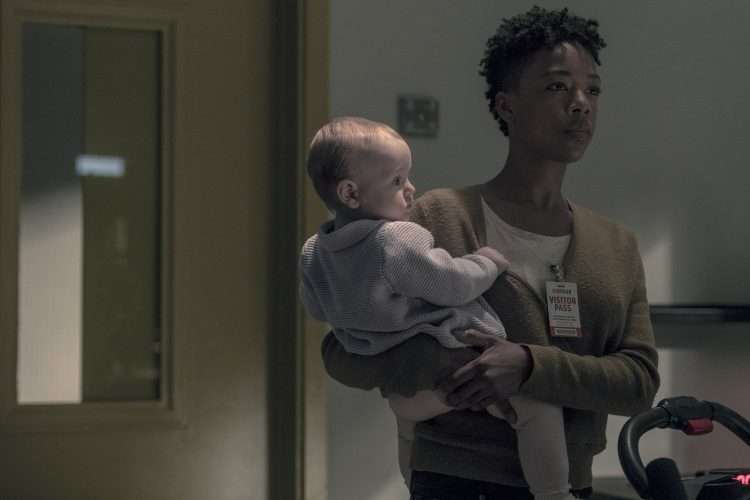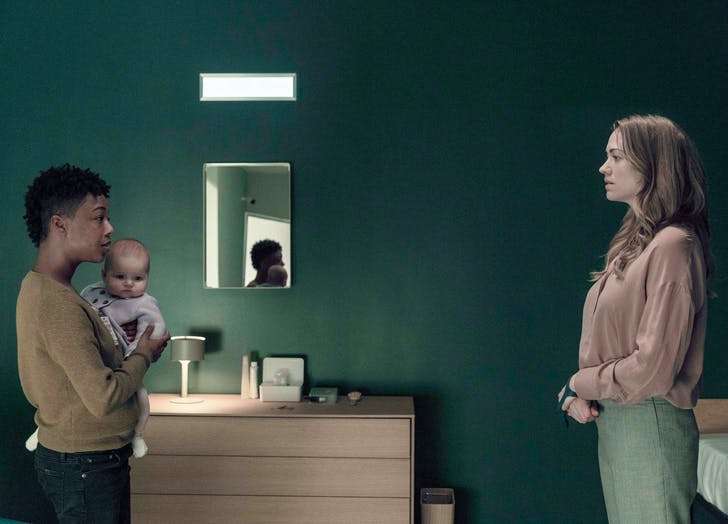Create a free profile to get unlimited access to exclusive videos, sweepstakes, and more!
Emmy Contenders: The Handmaid's Tale's Samira Wiley on voting rights and telling off Serena Joy

Welcome to Emmy Contenders 2020. This month, SYFY WIRE is speaking to some of the actors and artisans whose work earned them Emmy nominations this year. Today we speak with Samira Wiley, who previously won an Emmy (as a guest actress) and is nominated once again (as a supporting actress) for Hulu’s The Handmaid’s Tale.
Moira doesn’t get nearly enough screen time in The Handmaid’s Tale, but Samira Wiley, the actor who plays her, makes every moment count. Back in the Before Times, Wiley’s shooting schedule for the show was pretty cushy – she would fly back and forth between her home in California and the sets in and around Toronto on a loose timetable that allowed her to spend lots of quality time with her wife on the Cali end. That’s all going to change when production resumes, though.
Given the ongoing pandemic, crossing the international border won’t be quite so easy anymore, and her freedom of movement once she gets to the other side will be subject to new corona-related restrictions. She’ll probably have to quarantine, for one thing, and stay in-country until all her scenes for the season have been shot. She almost certainly won’t be allowed to wander around as much as she has in the past, either. Wiley says she’s okay with all these new precautions, looking at them through the prism of The Handmaid’s Tale itself: There is freedom to and freedom from, and the new rules of the pandemic, unlike the old rules of Gilead, can actually keep us safe. Wiley chatted with SYFY WIRE about embracing her domestic side during the lockdown, ripping into Serena Joy on set, and encouraging her fans to vote.
How has your quarantine been going? Did it give you time to read Margaret Atwood’s sequel to The Handmaid’s Tale, The Testaments?
I haven’t yet. I wonder if there is a part of me that is scared to read it? There is a part of me that wants to go back and read it once the show is over. I remember it took me a really, really long time to watch Orange Is the New Black after I left the show. I didn’t even watch that season for a long, long time. So I think I need to be a little more removed from it, because it feels weird. Like I know Margaret Atwood, you know what I mean? I heard that she put in a “thank you” to us, and names us, in the book. It’s just too much for me.
But quarantine has been interesting. Right before COVID-19 came and changed the world, I had a pretty busy summer in 2019, so I took a really long intentional break that fall. I was like, “I’m going to take a break, and then start back up.” My plan was to meditate, get in touch with myself, make sure I was taking care of my health, all those things. I took a six-month break. And then when March came, I thought I would be going back to Canada to shoot the show. I was so excited. And then … I was forced to take a break again. I really didn’t know what to do with myself! My wife has been working remotely, so I started getting in touch with my domestic side, to be honest. I started doing things that I never did before, like cleaning and washing dishes. I mean, I had done it before, but I’m just not very good at it. [Laughs.] So I have been in housewife mode, and honestly? I think I’m getting pretty good at it. [Laughs.] I figured out my own way of doing things. And there is a peacefulness in doing that. It does kind of calm me down.
Let’s talk about where Moira is now. She’s helping refugees. She’s protesting Canadian relations and immigration policies with Gilead, and getting arrested for that.
When she was in Gilead, she didn’t have any freedom. Now that she’s out, she’s made a decision about what she’s going to do, and she’s driven by what’s happening to other people. A lot of that probably has to do with June not being around. It’s almost by proxy: “Me doing all of this for everyone else, helping all of these other people, I’m somehow going to get to her.” There is so much drive in Moira to use her own strengths, and the things she’s good at, to help other people. I’m excited to see where this goes, but I’m also excited to see other parts of her life. Before all this, you know, she was in love with someone, so I’m excited to see Moira the person as well as Moira the activist.
You had a perfect line reading during the moment where Moira tells off Serena Joy, and calls her a gender traitor.
It was just so satisfying. I mean, I feel like this has been on the tip of my tongue for a few seasons now, but this is the first time I’m actually in a room with the person I had been wanting to say that to, and it was just so satisfying to read that in the script. And then to be able to actually look in this woman’s eyes and to be able to say that? Delicious. And I feel like that phrase has never rung more true than when I say it back to her. It’s just been the best experience to see the reaction that people have had watching it.
Did you discuss with Yvonne Strahovski whether Serena recognizes Moira, from the protests? What was it like prepping that scene with her?
I’m never on set on Yvonne, so that was delightful. But delight has no place in that scene. When the camera turned around to focus on Yvonne, I really had my way with the words. With the director’s permission, I changed them a lot for Yvonne’s close-up, when the camera was not on me, because I felt like this was a moment where I was biting into her soul, and saying all the things Moira had wanted to say to Serena Joy. I started cursing at her, because I felt like Moira has all this vitriol, and she’s just spewing it. So I called her the worst names, words I don’t even want to say out loud, like “you fucking bitch.” I used a word that I had never used before in my whole life! The “see you next Tuesday” word. It just has these wonderful consonants. And I felt like I was stabbing her with these words. Oh god! It sounds so horrible, talking about it now, because I’m not in that space. Saying all that now feels so violent. Literally, the second it was over, I went over to hug Yvonne and apologize to her. She was such a good sport. She did such a wonderful job. She was like, “Thank you for giving me that energy.”
Perhaps inspired by The Handmaid’s Tale, your own activism has grown over the years. You recently became involved with Michelle Obama’s non-partisan When We All Vote election protection campaign.
Playing Poussey on Orange Is the New Black and playing Moira on The Handmaid’s Tale helped become more clear on what I’m passionate about, and I’ve just been passionate about this — seeing what’s happening right now and understanding that this country belongs to the people who live here, people like you and me. A lot of times, people feel like things are happening to us, but we do have a voice. I remember the first time I voted, I was 18. I have a nephew now who is 18, and so it’s like, “You know you can go register to vote now? And even your friends who are 17, if they’re going to turn 18 before the election, they can preregister to vote.” It’s about understanding all the little things, even myths I thought were true before …
Such as?
Such as the myth that formerly incarcerated people in this country cannot vote. I thought that was a blanket thing across the entire country, and I didn’t even think to go out and research that or investigate that or challenge that, you know what I mean? Check to see if it’s real or not? We need to realize that these myths are just different forms of voter suppression. Some rules can vary from state to state, and not all apply nationwide. A friend of mine, during the midterm elections, said, “Well, I never registered, so I can’t go vote.” And I was like, “No, you can ask for a provisional ballot, and do it that way.” Just having a tiny bit more information …
So I’ve just been passionate about trying to empower people, letting them know they have a voice, letting them know they can do something about some of the things they care about. You can say something about that with your vote. My people who came before me, not all of them had a right to vote. I feel like people have literally given their blood, sweat, and tears for me to have that right.
Right now, there is some [false] debate about voting by mail.
It’s one of the safest ways to vote. A very large percentage of votes come in by mail, and it’s been safe for a fairly long time. We have a voice. The women in The Handmaid’s Tale, they do not. They are silenced. Until we’re in a place like The Handmaid’s Tale, we need to vote.



























